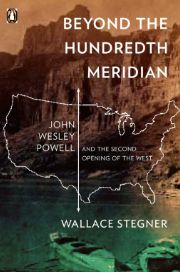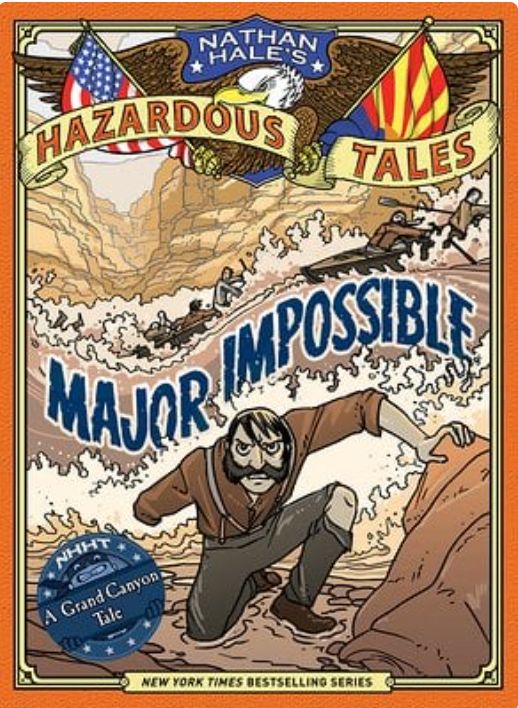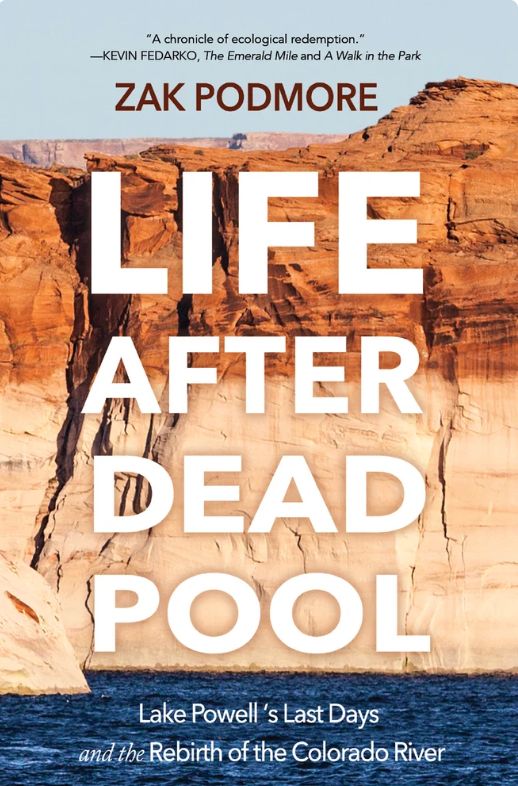Each week as part of SunLit — The Sun’s literature section — we feature staff recommendations from book stores across Colorado. This week, the staff from Out West Books in Grand Junction recommends a prescient Stegner classic, a whitewater adventure and hope for the Colorado River.
Beyond the Hundredth Meridian
By Wallace Stegner
Penguin Books
$18
March 1992
Purchase

From the publisher: Wallace Stegner recounts the successes and frustrations of John Wesley Powell, the distinguished ethnologist and geologist who explored the Colorado River, the Grand Canyon, and the homeland of Indian tribes of the American Southwest. A prophet without honor who had a profound understanding of the American West, Powell warned long ago of the dangers economic exploitation would pose to the West and spent a good deal of his life overcoming Washington politics in getting his message across. Only now, we may recognize just how accurate a prophet he was.
From Marya Johnston, owner: I know this is an old book, but there are so many new residents in our state, maybe they should be introduced to classics of western literature and conservation. What better way to start than with this book?
I first read this book as a college student and I loved it. It recently came out as an audio book from libro.fm , so I decided to give it a listen. Wow. Now that I know so much more about western history, portions of the book I breezed through when younger, take my breath away now. Wallace Stegner is just a master. His prose is the standard by which all other books about the West should be measured. Powell’s life has been chronicled many times, but everyone could better understand the West by reading this masterpiece.
Today, as multiple fires rage on the Western Slope and our part of the world gets hotter and drier, I shake my head in shame that Powell made dire predictions about trying to turn the West into the same country as east of the hundredth meridian and we have still not caught up to him. I was impressed long ago by his grasp of the land and its complications, how he fought for an understanding of the West in Washington in the late 1800s, and yet today lawns and golf courses are still getting watered in the heat of the day. Will we ever stop trying to make the West something it is not?
“He tried to conserve the West’s natural wealth so that it could play in full its potential part in the future of the United States. He tried to dissipate illusions about the west, to sweep mirage away. He was a great man and a prophet.” This is from Bernard DeVoto’s introduction to the book, and to whom the book is dedicated. As you may remember from one of my previous reviews, “This America of Ours,” about DeVoto, he and Stegner are heroes to me; the West’s best champions and writers. Read this book. Give it to all your friends.
Nathan Hale’s Hazardous Tales: Major Impossible
By Nathan Hale
Harry N. Abrams
$15.99
December 2019
Purchase

From the publisher: John Wesley Powell always had the spirit of adventure in him. As a young man, he traveled all over the United States exploring. When the Civil War began, Powell went to fight for the Union, and even after he lost most of his right arm, he continued to fight until the war was over.
In 1869, he embarked with the Colorado River Exploring Expedition — 10 men in four boats — to float through the Grand Canyon. Over the course of three months, the explorers lost their boats and supplies, nearly drowned, and were in peril on multiple occasions. Ten explorers went in, but only six came out. Powell would come to be known as one of the most epic explorers in history.
From Marya Johnston, owner: The subtitle of this graphic novel is a little misleading, as it covers more than just the Grand Canyon. It begins with Powell’s first expedition down the Green and Colorado rivers, beginning in Green River, Wyoming, and has flashbacks to his earlier life as a young man in Ohio and Illinois, his time on the battlefields of the Civil War — from which he came away minus an arm, and his associations with, and respect for, Native Americans.
Though it’s sold as a young person’s graphic novel, the research involved (Nathan Hale has been down the Grand Canyon five times and his bibliography is spot on) make this a book for all ages.
Life After Dead Pool
By Zak Podmore
Torrey House Press
$23.95
August 2024
Purchase

From the publisher: After decades of drought, the American West is stretched to the breaking point. A changing climate and design flaws in the Glen Canyon Dam have pushed the once-massive Lake Powell reservoir to the brink of collapse — putting at risk millions of people who depend on the Colorado River for water, agriculture, and electricity. Now, as Glen Canyon reemerges, its surprising ecological rebirth reminds us that nature’s capacity to heal may well outpace our own imaginations.
Environmental journalist Zak Podmore explores the complex challenges ahead and reframes the inevitable loss of Lake Powell as a turning point for a more sustainable future. Through an arresting mix of science and storytelling, “Life After Dead Pool” debunks the notion that the West’s water challenges are unsolvable and invites us to secure a future where the Colorado River once again runs free.
From Marya Johnston, owner: It’s hard these days to read anything about water in the West without some sort of anxiety. It’s double anxiety for those of us west of the Continental Divide. Our reliance on the Colorado River is no joke. And Lake Powell? Well, I’ve read my fair share of Ed Abbey, so I’ve never had a great opinion of the place. All I could ever think about were the ruins and petroglyphs buried under the water.
Zak Podmore’s journalistic and environmental experience (and top notch writing) make him the perfect person to contend that the lake’s days are numbered. But there’s hope. Podmore lets us imagine a day where the Colorado flows freely through Glen Canyon again and the silt gets carried away by the water to where it is best used in the agricultural lands to the south. One way or another, Podmore says, things have to change. We have to either let the river flow freely or let Lake Powell fill up with silt. And yes, it can be done. We can live without that dam.
“…Lake Powell will begin to disappear downstream. Glen Canyon will bloom again. One day there will be light at the end of the tunnel, yes, and also: a river.”
THIS WEEK’S BOOK RECS COME FROM:
Out West Books
533 Main St., Grand Junction

As part of The Colorado Sun’s literature section — SunLit — we’re featuring staff picks from book stores across the state. Read more.
Type of Story: Review
An assessment or critique of a service, product, or creative endeavor such as art, literature or a performance.
